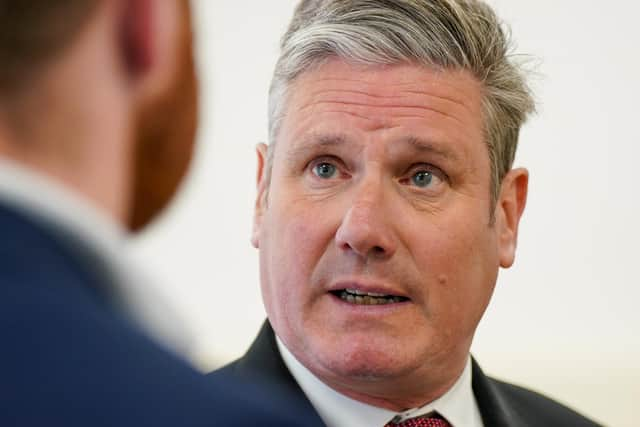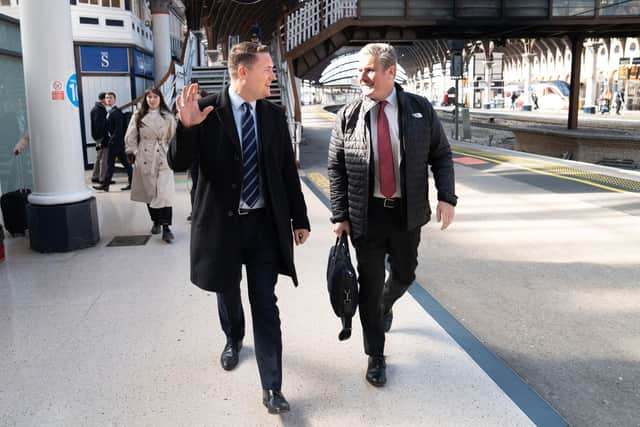Keir Starmer: NHS needs ‘real reform’ to survive
He said people are “terrified” about ambulance and A&E waiting times, as well as the long waiting list for elective treatment, when he visited a medical training facility at the University of York with Shadow Health Secretary Wes Streeting.
Sir Keir also criticised the Government for failing to resolve the pay disputes, which have seen doctors and nurses stage a series of disruptive strikes, claiming that Prime Minister Rishi Sunak appears to be more focused on maths.
Advertisement
Hide AdAdvertisement
Hide AdBut the Labour leader refused to say whether he thought most NHS staff deserved more than the planned 5 per cent pay rise.


“We need to fix the current problems, of course we do,” he said. “We've got terrifying waiting lists and terrifying waits for ambulances.
“But we've also got to fix the fundamentals and reform the NHS so it's fit for the future.”
Mr Streeting said Labour will ensure fewer patients require hospital treatment, by shifting resources to help short-staffed GP practices, and stretched mental health and social care services.
Advertisement
Hide AdAdvertisement
Hide AdMr Streeting promised the “biggest expansion of NHS staff in history”, claiming resources would be provided to double the number of training places for doctors to 15,000 a year and create another 10,000 places for student nurses and midwives each year.


According to Labour, more than £3bn a year would be obtained for this training programme by abolishing non-dom tax status.
Mr Streeting also pledged to raise money for mental health hubs “in every community” and 8,500 mental health workers, by abolishing the tax loophole that benefits private equity fund managers.
He has previously stated that Labour plans to use the private sector to help tackle NHS waiting lists in the short-term, but he wants it to remain a publicly funded service that is free at the point of use.
Advertisement
Hide AdAdvertisement
Hide Ad“People can judge Labour not just on what we say we want to do in the future, but on our proud record in government,” he added.
“Thirteen years of Labour government delivered the shortest waiting times and the highest patient satisfaction in history.
“Compare that with 13 years of Conservative government and what they've got to show for it: the lowest patient satisfaction ever in the NHS, and the highest waiting lists and terrified people waiting for an ambulance not just for hours, but in some tragic cases, days.”
The NHS has just emerged from its busiest winter on record, when ambulance response time and A&E waiting times hit all-time highs.
Advertisement
Hide AdAdvertisement
Hide AdIn December, the average wait time for Category 2 ambulance calls, for emergencies such as heart attacks and strokes, was more than 90 minutes - five times higher than the 18-minute target.
In February, around 10 per cent of patients (125,505 people) who went to major A&E departments in England waited at least 12 hours to be admitted, transferred or discharged.
The number of people waiting more than 18 months for elective care dropped by a third between January and February, to 29,778, while the number of patients waiting more than one year dropped by 17,000 to 362,498.
However, the progress has been hampered by a recent wave of strikes. More than 195,000 appointments had to be postponed when junior doctors staged a 96-hour strike last week.
Advertisement
Hide AdAdvertisement
Hide AdHealth Secretary Steve Barclay said the Government will begin talks with the BMA when the union “pauses its strikes” and abandons its “unrealistic” demand of a 35 per cent pay increase.
He also said the recent strike “clearly had an impact on many patients”.
The Government’s offer of a 5 per cent pay rise for most members of NHS staff, including paramedics and nurses, has been accepted by members of the trade union Unison, but rejected by the Royal College of Nursing.
The union has announced a 48-strike, involving NHS nurses in emergency departments, intensive care, cancer and other wards, will begin on April 30.